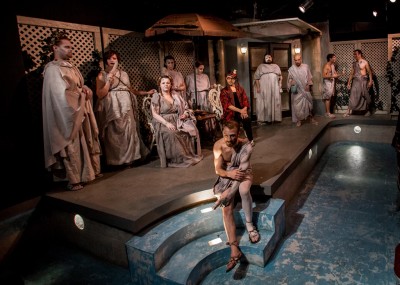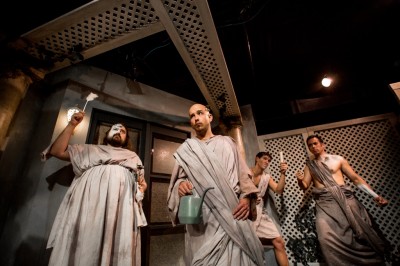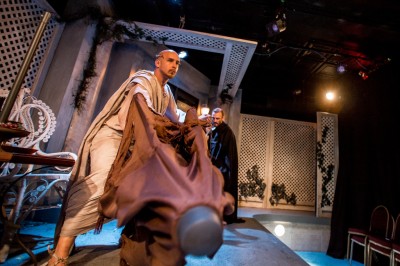Romulus

By Gore Vidal
Adapted from Friedrich Durrenmatt
Directed by Kasey Foster
Produced by Oracle
A Pleasing Tragicomic Fable about a Dying Order
The first thing to know about Durenmatt’s Romulus is that he called it a history play with no historical basis. Several different people from the period in the fifth century arbitrarily labeled “the fall of the Western Roman Empire” are conglomerated here, and their relationships are redefined for dramatic effect. But that’s alright, because this story, presented now by the capable team at Oracle, is more engaging and thought-provoking than a treatment of the actual events would likely be.
Joanna Iwanicka’s set design establishes the absurd tone before the story begins. We are in a Trivoli with wicker chairs and a patio umbrella. The effete courtiers (Sabrina Conti and Kathryn Bartholomew) are half turned to stone, with moss and cracks covering their stiff, grey skin. They chant honorifics and proclamations, and move in rhetorical sweeps. Not even the arrival of a critically wounded messenger (Luke Daigle) can shake them from their ossified rituals.
The emperor Romulus (Kevin Cox) sits aloof from all this, monitoring his chickens’ egg-laying and ignoring reports of the rampaging Gothic army. His empire, which had been collapsing slowly, is now falling all at once, and he doesn’t seem to care. To his wife, Julia (Susan Wingerter), a staunch believer in “Romanism,” this is incomprehensible. She is Rome, and Rome is civilization and everything else holy. How can he give up on her/it? And how can he sell off the imperial art collection at such a low price? But she has a plan, even if it’s a humiliating decline from Rome’s glory days. Have pants manufacturer Otto Rupf (pompously played by Jeremy Trager) bribe the Goths to go away, and in exchange, give him the princess Rea (Alexis Randolph) in marriage. To Romulus, this is appalling. Personal happiness should never be sacrificed for empty principles. And pants are stupid.
Director Kasey Foster, who is directing a pre-existing script for the first time, has assembled an excellent cast all around. Cox’s sardonic, clever Romulus is a marked contrast to the dogmatic hard-liners surrounding him. But Wingerter’s Julia is a commanding presence, and you see when the pretense finally drops away that she’s been fighting for her only place in the world, and an empire that once accomplished things. Most of the other characters are exaggerated for comedic effect. I especially enjoyed Rory Jobst as Tulius Rotundus, an overstressed administrator who still plans tax reforms while the Goths are right outside.
Colin Morgan, however, as the captured Roman general Aemillian, plays his role completely straight, introducing the serious moral conflict and danger into the story. Aemillian was supposed to marry Rea, but after his capture by the Goths, he was tortured and disfigured. Now, he’s determined to sacrifice anything to stop the Goths, and he doesn’t bother with the rhetorical flourishes. This presents Romulus with a more serious challenge, and he has to finally reveal his true feelings and aims. The empire is not only unsalvageable, but evil. It must be allowed to die.
It is a credit to all involved that they can bring out the emotional and ideological complexity in a goofy, absurd work. Costume designer Eli Hunstad has clad the characters in sheets and sandals with treads on the bottom, but the statue make-up and the deliberate anachronisms work with these budgetary necessities to create a coherent world. Of course it’s silly that the Goths would select “Progress and Slavery” as their slogan or feel the need to concoct “Gothicism” as a justification for conquest, but in the world of the play, modern ideas pervade. Oracle asks “if the empire collapses, will the new empire be any better?” I’m not convinced the analogy they draw between American and Western Rome is apt, but I do think we’re undergoing a time of transition (as always). It’s interesting to think about what happens to people in a movement when it needs to be abandoned. Will they recognize when that time comes, and can they trust the new order to treat them fairly?
Highly Recommended
Jacob Davis
Reviewed October 11, 2014.
For more information, see Theatre in Chicago.
At Oracle Theatre, 3809 North Broadway, Chicago. Call 252-220-0269 or visit http://publicaccesstheatre.org/. Tickets are free. Runs October 11- November 22, 2014. Monday, Friday, and Saturday at 8:00 pm, Sunday at 7:00 pm. Running time 90 minutes with no intermission.



